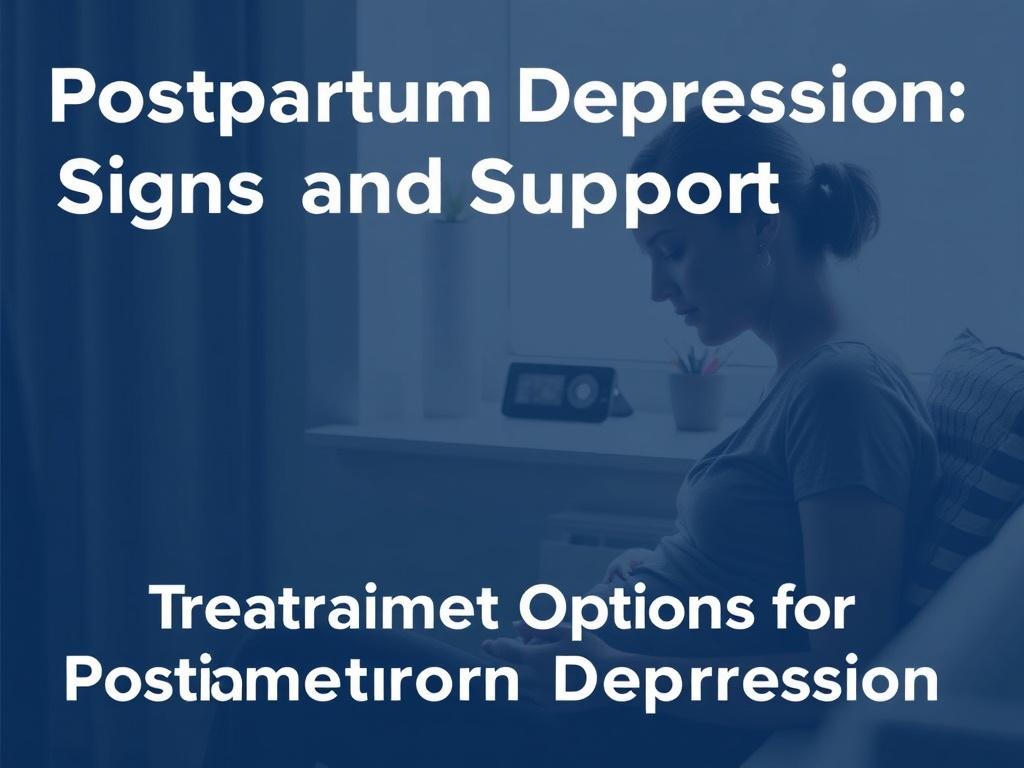SQLITE NOT INSTALLED
Bringing a new life into the world is often described as one of the most beautiful and transformative experiences a person can have. Yet, beneath the joy and excitement, many new mothers face an overwhelming emotional challenge known as postpartum depression. This condition can significantly affect mental health and well-being, impacting not only the individual but also their family and the baby’s development. In this extensive article, we will explore postpartum depression signs and support, diving deep into understanding the symptoms, causes, and most importantly, the available resources for someone navigating this difficult phase.
Whether you are a new mom searching for answers, a concerned partner, or a friend or family member wanting to help, this guide will equip you with the knowledge and tools necessary to recognize the signs and provide meaningful support.
What Is Postpartum Depression?
Postpartum depression (often abbreviated as PPD) is a form of clinical depression that occurs after childbirth. Unlike the frequently talked about “baby blues,” which generally resolve within a couple of weeks, postpartum depression involves more intense and long-lasting feelings of sadness, anxiety, and fatigue that interfere with daily life.
Statistics show that postpartum depression affects about 1 in 7 women after childbirth, though it can also impact fathers and adoptive parents. The condition arises from a complex mix of hormonal changes, lifestyle adjustments, and emotional stressors. It is important to realize that postpartum depression is a medical condition—not a sign of weakness—and it is treatable.
How Postpartum Depression Differs from Baby Blues
Many new mothers experience the so-called “baby blues” shortly after delivery, which include mood swings, mild irritability, and tearfulness. These symptoms tend to peak a few days after birth and improve within 2 weeks. In contrast, postpartum depression symptoms are more severe and persist beyond two weeks, requiring professional attention.
- Baby Blues: Mild mood changes, fatigue, usually resolve within two weeks.
- Postpartum Depression: Severe mood disturbances, feelings of hopelessness, lasting more than two weeks.
Recognizing Postpartum Depression Signs
One of the biggest barriers to seeking help for postpartum depression is that new mothers often do not recognize the signs. Understanding these symptoms is the first step toward healing.
Common Symptoms of Postpartum Depression
Postpartum depression manifests in a variety of emotional, physical, and behavioral symptoms. These signs can differ from person to person, but some of the common indicators include:
- Persistent sadness or low mood lasting more than two weeks
- Excessive crying spells without clear reason
- Intense feelings of guilt, worthlessness, or shame
- Loss of interest or pleasure in activities once enjoyed
- Difficulty bonding with the baby
- Withdrawal from family and friends
- Changes in appetite or weight
- Sleep disturbances beyond typical newborn-related exhaustion
- Feeling restless or irritable
- Difficulty concentrating or making decisions
- Thoughts of harming the baby or oneself — this is a medical emergency
Recognizing these signs early and sensitively can make the difference between suffering in isolation and receiving the help needed.
Why It’s Important to Identify the Signs Early
Early recognition of postpartum depression signs enables timely intervention and can prevent symptoms from worsening. Untreated postpartum depression can lead to severe consequences, including disrupted bonding with the baby, difficulty breastfeeding, and increased risk of chronic depression. Furthermore, it can affect the entire family unit’s well-being.
Causes and Risk Factors of Postpartum Depression

Postpartum depression does not have a single cause. Instead, it is the result of a combination of psychological, biological, and environmental factors. Understanding these causes can help demystify the condition.
Hormonal Changes After Birth
The most significant factor in postpartum depression is the drastic hormonal shift occurring after childbirth. Levels of estrogen and progesterone drop rapidly, which can trigger mood swings and depressive symptoms. This abrupt change affects brain chemistry linked to mood regulation and stress response.
Psychological and Emotional Factors
The transition to motherhood brings many emotional challenges. New mothers might experience anxiety over their capability to care for the baby, fear of losing identity, and stress related to sleep deprivation and lifestyle adjustments. Previous mental health histories also play a role in increasing the risk.
Environmental and Social Risk Factors
Several external factors contribute to postpartum depression risk, including:
- Lack of social support: Feeling isolated or lacking help from family or friends
- Relationship difficulties: Conflicts with partner or family stress
- Financial strain: Stress related to money or job insecurity
- Stressful life events: Trauma, loss, or other significant stressors in or around pregnancy
- Complications during pregnancy or childbirth: Health issues impacting baby’s or mother’s wellbeing
Diagnosing Postpartum Depression
Because postpartum depression symptoms can overlap with general exhaustion and normal emotional fluctuations after childbirth, diagnosis requires careful assessment by healthcare professionals.
How Healthcare Providers Diagnose PPD
Medical providers usually assess postpartum depression through a combination of interviews and screening questionnaires. The most common screening tools include:
| Screening Tool | Description | Use |
|---|---|---|
| Edinburgh Postnatal Depression Scale (EPDS) | A 10-question self-administered questionnaire focused on mood and anxiety symptoms over the past 7 days. | Widely used for screening postpartum depression. |
| Patient Health Questionnaire-9 (PHQ-9) | A 9-question tool that evaluates depression severity. | Used in many clinical settings including postpartum. |
| Postpartum Depression Screening Scale (PDSS) | A 35-item scale specifically designed for postpartum women. | More comprehensive assessment. |
A positive screening result prompts a thorough clinical evaluation to confirm diagnosis and determine the best treatment approach.
How to Support Someone with Postpartum Depression
If someone you love is showing postpartum depression signs, knowing how to provide effective support can be lifesaving. Compassion, patience, and understanding are key.
Creating a Safe and Supportive Environment
New mothers with postpartum depression often face feelings of shame, frustration, and isolation. Letting them know they are loved and supported regardless of their struggles is crucial. Here are some ways to create a supportive environment:
- Listen without judgment: Allow them to openly express feelings without minimizing or rushing.
- Offer practical help: Assist with household chores, meal prep, or caring for the baby.
- Encourage professional help: Gently suggest seeking evaluation and treatment from healthcare providers.
- Stay connected: Keep in touch regularly, offer companionship, and avoid letting them isolate.
Supporting Self-Care and Recovery
Postpartum depression recovery involves self-care and often therapy or medication. Help the person prioritize rest, healthy eating, hydration, gentle exercise, and moments of relaxation. Joining them for walks, preparing nutritious meals together, or simply sharing quiet time can contribute greatly.
Treatment Options for Postpartum Depression

The good news is that postpartum depression is highly treatable. The effective treatment options vary depending on the severity and individual’s needs but typically include therapy, medications, and lifestyle changes.
Psychotherapy for Postpartum Depression
Several types of therapy have proven effective for postpartum depression, including:
- Cognitive Behavioral Therapy (CBT): Helps identify and change negative thought patterns and behaviors.
- Interpersonal Therapy (IPT): Focuses on improving relationship skills and social support.
- Supportive Counseling: Offers empathetic listening and coping strategies.
Therapy not only reduces symptoms but also equips mothers with tools to manage future stressors.
Medication for Managing Symptoms
Antidepressants, particularly selective serotonin reuptake inhibitors (SSRIs), may be prescribed to help regulate brain chemistry. The safety of medications during breastfeeding is carefully considered, and many medications are compatible with nursing. It’s essential to discuss risks and benefits with a healthcare provider.
Lifestyle and Alternative Therapies
Regular physical activity, mindfulness meditation, yoga, and support groups can supplement traditional treatments. While not substitutes for medical care, these approaches promote overall well-being.
Impact of Postpartum Depression on Babies and Families
Postpartum depression affects not only the mother but also the infant and entire family. Understanding these effects highlights the importance of timely intervention.
Effects on Infant Development
Mothers experiencing postpartum depression may have difficulty bonding and responding to their babies’ needs, which can influence the child’s emotional and cognitive development. Babies may experience:
- Delayed language and social skills
- Increased fussiness or sleep problems
- Issues with attachment security
Early treatment of postpartum depression helps improve maternal-infant interactions, promoting healthier child development.
Effects on Family Dynamics
Partners and other children in the family can also feel the impact of postpartum depression. There may be increased household tension, reduced parental functioning, and strain on relationships. Support and education for the entire family help create a balanced environment conducive to healing.
Preventing Postpartum Depression: Is It Possible?
While postpartum depression is not always preventable, proactive steps can reduce the risk or severity of symptoms.
Strategies to Lower Postpartum Depression Risk
- Educate yourself: Learning about postpartum depression signs helps in early recognition.
- Build a support network: Friends, family, and community resources can provide practical and emotional help.
- Maintain prenatal and postnatal checkups: Discuss mental health openly with healthcare providers.
- Prioritize self-care: Rest, nutrition, and stress management during pregnancy and after delivery.
- Plan for postpartum support: Arrange for assistance during the early weeks to lessen the burden.
Resources and Help for Postpartum Depression
Many avenues exist to find support and treatment for postpartum depression. It’s essential to reach out without delay if you or someone you know is struggling.
Professional Help
- Obstetricians and Midwives: They often screen for postpartum depression during checkups.
- Mental Health Specialists: Psychologists, psychiatrists, and counselors provide diagnosis and therapy.
- Primary Care Physicians: They can refer to specialists and manage medication.
Support Groups
Joining postpartum depression support groups allows sharing experiences with others who understand. Many organizations provide in-person and online groups tailored to new mothers and families.
Hotlines and Online Resources
| Resource | Description | Website/Phone |
|---|---|---|
| Postpartum Support International (PSI) | Comprehensive support, education, and referrals for postpartum mood disorders. | www.postpartum.net 1-800-944-4773 |
| National Suicide Prevention Lifeline | Confidential crisis support available 24/7. | 988 or 1-800-273-TALK (8255) |
| Mental Health America | Resources and screening tools for mental health conditions. | www.mhanational.org |
Real Stories: Voices of Mothers Who Overcame Postpartum Depression
Hearing from women who have walked this path can be inspiring and reassuring. Many mothers who faced postpartum depression found hope through diagnosis, support, and treatment, emerging stronger and more aware.
One mother shared, “At first, I felt ashamed. I thought I should just be happy with my baby. But when I finally spoke up, I found help and understanding. It was a long journey, but now I cherish every moment with my child.”
These personal stories amplify an important message: help is available, and recovery is possible.
Conclusion: Embracing Hope and Healing
Postpartum depression is a challenging chapter in the early days of parenting, but it is not one you need to face alone. Understanding the postpartum depression signs and support options is vital for timely help. With compassion, professional care, and community aid, healing is well within reach.
If you are experiencing symptoms, reach out. If someone you love shows signs, offer your support with kindness and patience. Together, we can break the silence and stigma surrounding postpartum depression, paving the way for healthier families and brighter beginnings.
Remember, postpartum depression is real, it is treatable, and recovery is possible. You are not alone.
